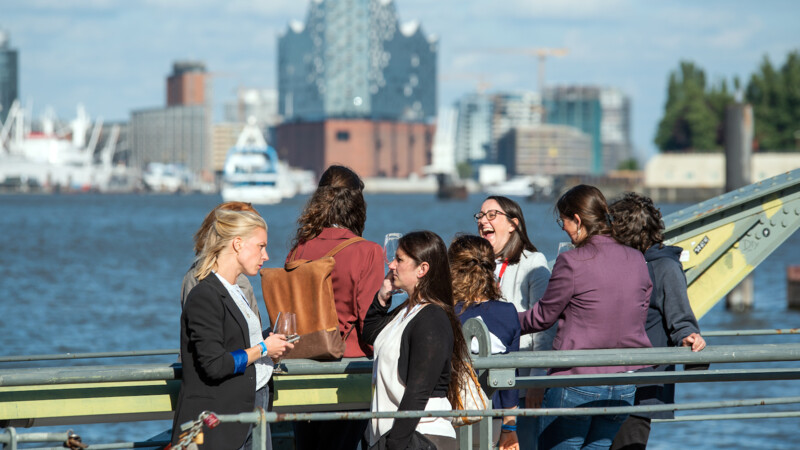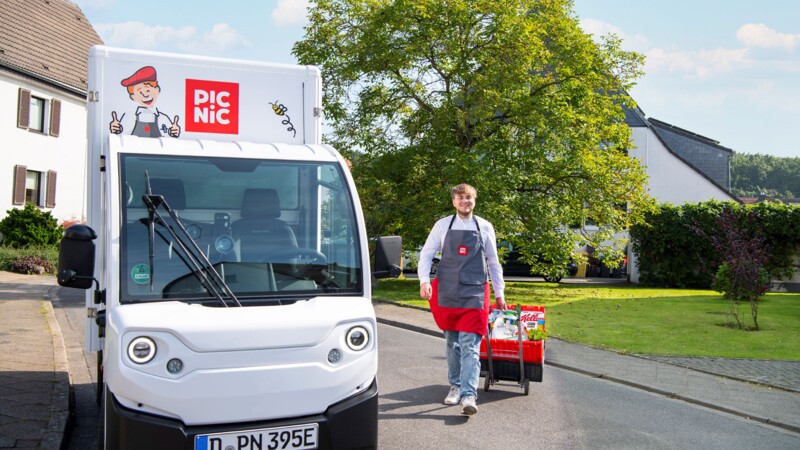"The NCA acts as a bridge-builder between early-stage start-ups and some 21 north German companies keen on both a good return on their investment and gaining access to promising innovations," Sinderhauf pointed out. That creates a win-win situation in which established companies gain access to innovative solutions. Founders in turn benefit from the expertise and contacts of their investors, who are often potential customers. About 15 start-ups complete the six-month accelerator every year and 54 investments have already been made. NCA is now backing a tenth batch with an eleventh in the pipeline.
Mentors and industry experts at the Next Commerce Accelerator (NCA) in Hammerbrooklyn lend their support to promising, diverse start-ups throughout Hamburg and help them hone their business models. The accelerator is one of several fostering the interests of young entrepreneurs in the city. "We started in 2017 as a start-up accelerator for trade-related business models, but have since evolved into a cross-sector innovation network, start-up acceleration scheme and investment fund," said Mariella Sinderhauf, Manager. Start-ups can avail of grants of up to EUR 150,000 from various sources.
NCA as bridge builder
Over 200 mentors cover every start-up environment
At the start of scheme, there is always a "critical look under the bonnet", said Sinderhauf. Investors take part in the first workshop. "That may seem intimidating at first, but in any case the start-ups get immediate market feedback. In some cases, there are even greater synergies that can lead straight to a pilot or even a follow-up investment." Support later on is based on needs. "We are in close contact with each start-up. I ring each team once a week and together we define needs and support. We meet every fortnight so that founders can stay in contact with each other and help each other." The NCA has over 200 mentors in its database to cover any issues a start-up may have. A business check is held with one of the NCA's managing partners every month.

Fresh catches and Ruuky
NCA's flexible approach to the weekly scheme is proving successful, Sinderhauf stressed. The support is highly customised, for instance, to the Frisch Gefischt start-up. "The coast is only an hour away. But what is served in Hamburg's restaurants has often been detoured via the Netherlands. That's where the big fleets send their catch to be auctioned off." The founders of Frisch Gefischt work with fishing boats and send their fresh catches straight to restaurants and caterers. The start-up values sustainable fishing methods and the observance of closed seasons and took part in Batch 7. Meanwhile, the company has 18 employees, said Sinderhauf. The growth of the Ruuky start-up (formerly pockid) is also going according to plan after the Hamburg-based fintech secured EUR 4 million in seed funding last year. Ruuky offers young people aged 18 and over or parents, who want to open a current account for their offspring, a bank account, a banking app and a virtual and physical debit Mastercard. Account holders are not eligible for an overdraft facility. Ruukky was one of the start-ups in NCA's sixth batch.
Success of Localyze
Localyze brought its all-in-one software solution for mobilising skilled workers across the globe to market maturity in Batch 2. The company secured USD 12 million in a Series A funding round in 2021 and topped that off with USD 35 million in a Series B round recently. The founders now hope to launch on the U.S. market. Localyze handles the entire relocation process for international employees of clients like Free Now, Babbel, Tier Mobility and DeepL. That makes it much easier for companies to hire professionals across borders. Given the current shortages of skilled labour, Localyze is proving a real success story.
ys/pb
Other parts in our series: "Idea Accelerators“
1) Start-ups now shaping media in Hamburg thanks to Media Lift
2) ZAL Innovation Accelerator boosting good ideas
3) Foodlab accelerator coming up with recipes for success
4) Start-ups join forces in Digital Hub Logistics for climate protection
Sources and further information
More
Similar articles

Ten global start-ups secure grants from Scaleup Landing Pad Hamburg


